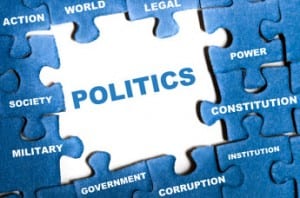The Politics of Renewable Energy
October 4, 2014In the past, clean energy had predominantly been an environmental issue. Environmentalist groups had advocated renewable energy as a way to preserve the world, citing global warming and the hazardous features of fossil-fuels as serious problems that would have to be dealt with sooner or later. As time went on, climate change has began to attract serious attention, especially from governments that are beginning to support clean energy. For these governments, energy has become a matter of politics, and political issues are beginning to direct the future of clean power.
Throughout the world, governments act as land stewards. As such, governments often dictate whether or not energy projects will take form within their borders. Solar and wind energy systems require significant land investments and are also quite costly from a financial perspective. Dedicating land and money to these projects is no longer an environmental issue for most governments, and politics holds sway over whether or not these projects will take form.
In some countries, the issue of climate change is quite controversial. The idea that humanity is responsible for this recent cycle of climate change is not a comfortable idea for most, and the consequences associated with the phenomenon are even less comfortable to think about. In the U.S., there are many politicians and political groups that denounce the reality of climate change, suggesting that it is a natural cycle that will occur without human action. In many cases, the politics surrounding the issue determine whether or not renewable energy projects receive financial support from the federal government.
 The role that politics plays in the renewable energy field is most clear in Australia. Recent changes in the government have reduced the support that the clean energy field is receiving in the country. The Liberal Government believes that clean energy is not a viable investment and has reduced the financial support it provides to projects, particularly those involving solar energy. The country’s lawmakers are debating the feasibility of Australia’s Renewable Energy Target as well, with some suggesting that achieving the country’s clean energy goals is impossible. The lack of government support has put the future of many energy projects currently under development in jeopardy.
The role that politics plays in the renewable energy field is most clear in Australia. Recent changes in the government have reduced the support that the clean energy field is receiving in the country. The Liberal Government believes that clean energy is not a viable investment and has reduced the financial support it provides to projects, particularly those involving solar energy. The country’s lawmakers are debating the feasibility of Australia’s Renewable Energy Target as well, with some suggesting that achieving the country’s clean energy goals is impossible. The lack of government support has put the future of many energy projects currently under development in jeopardy.
Climate change and renewable energy have become political platforms, which are often brought to the forefront of many debates when politicians are campaigning for office. While this trend has certainly attracted more attention to the clean energy field, it has also slowed the adoption of clean energy to some degree.

 With over 15 years of reporting hydrogen news, we are your premier source for the latest updates and insights in hydrogen and renewable energy.
With over 15 years of reporting hydrogen news, we are your premier source for the latest updates and insights in hydrogen and renewable energy.